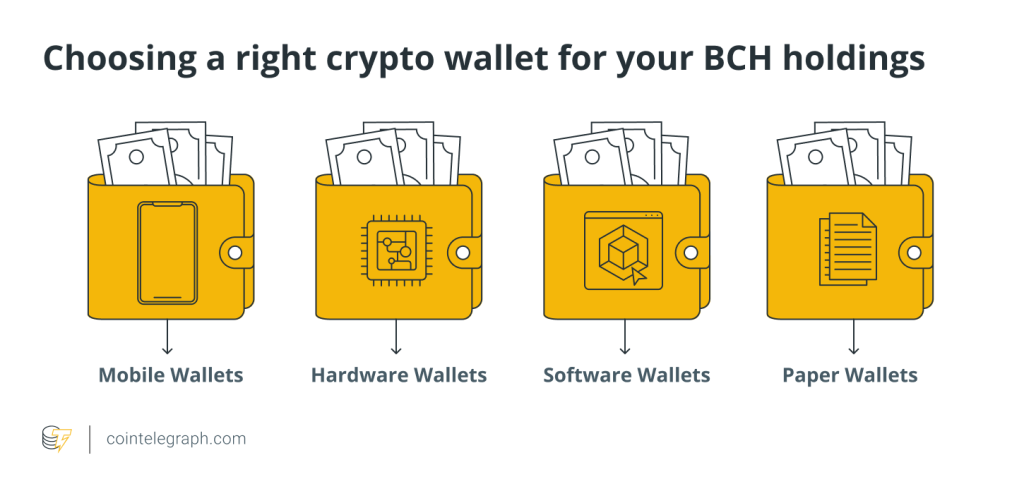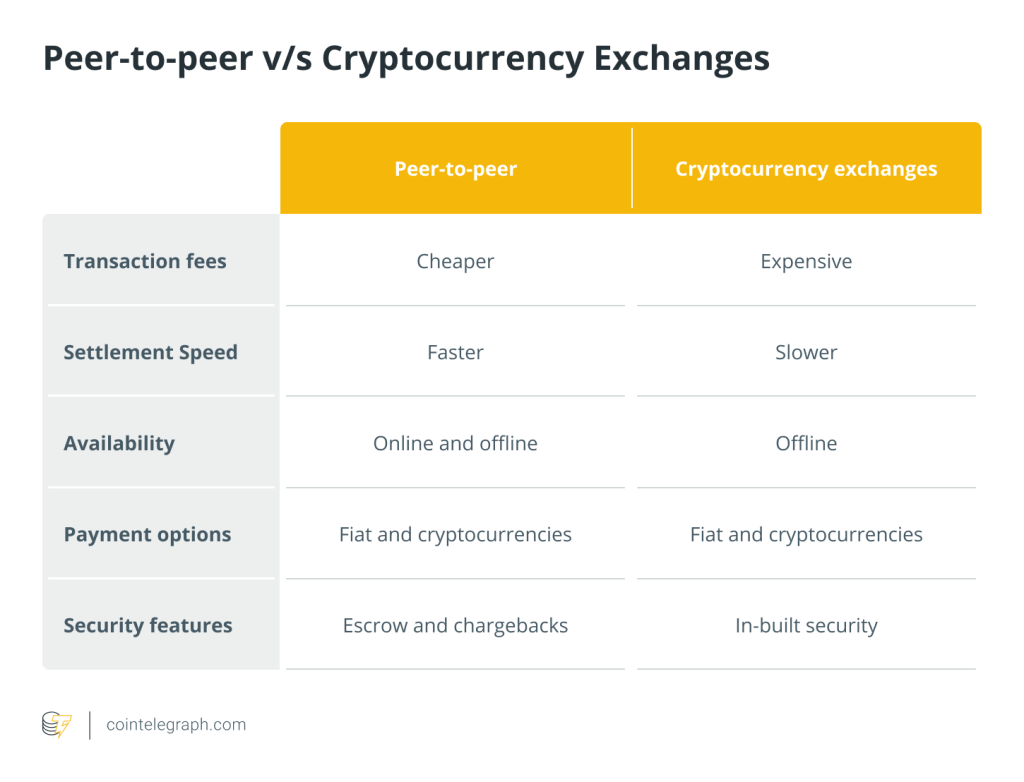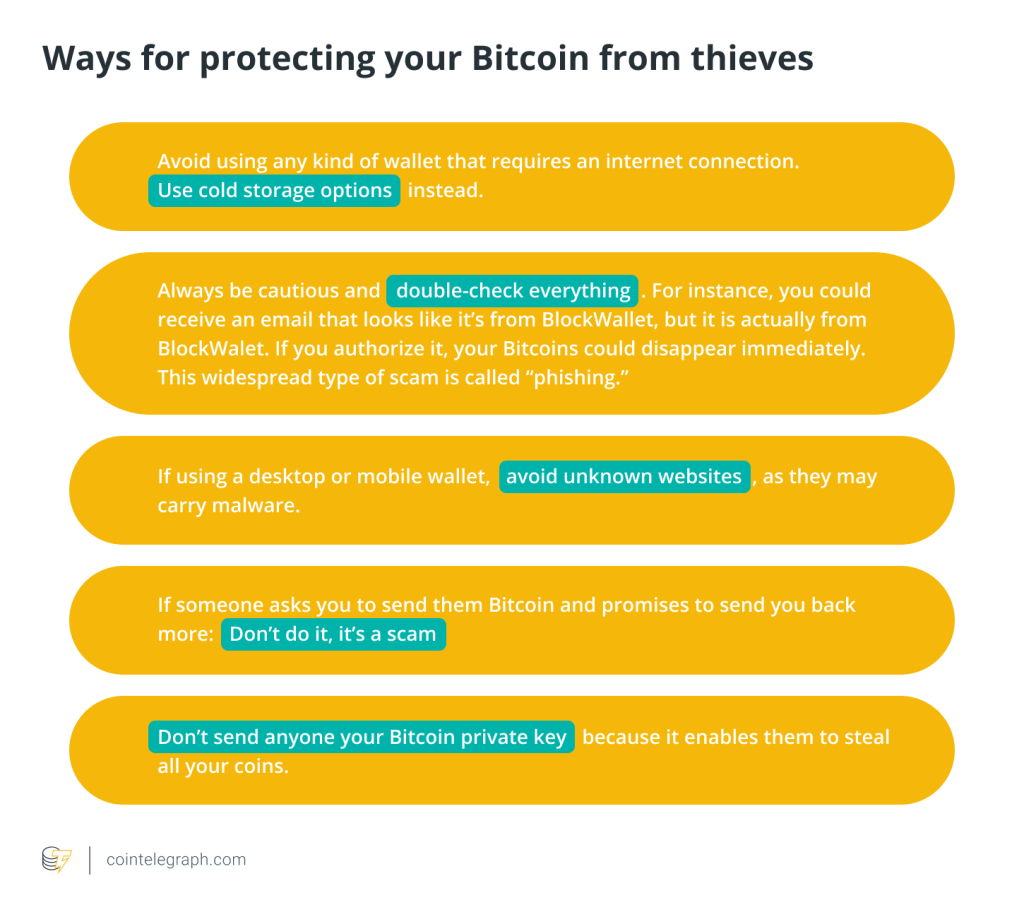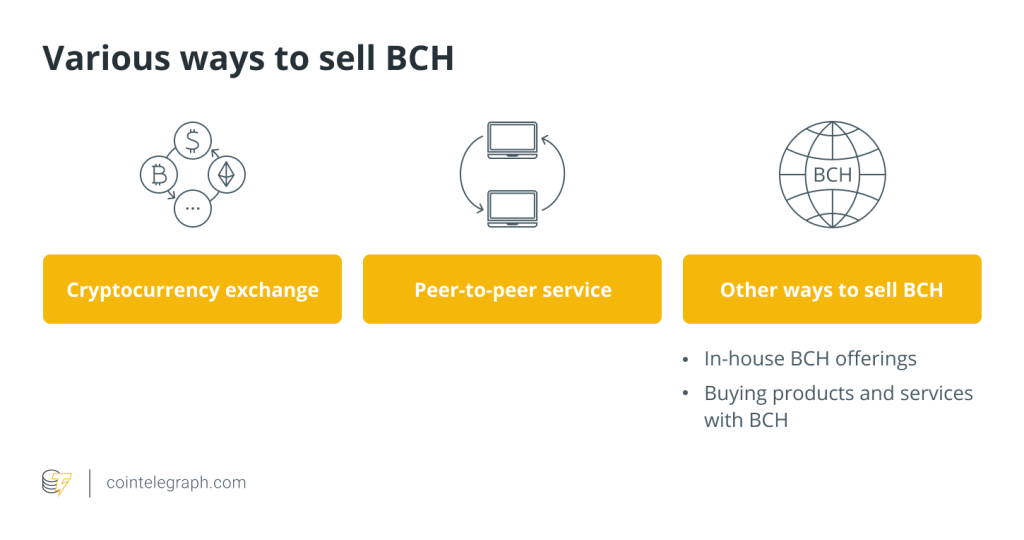Bitcoin Cash wallets: A beginners guide to storing BCH


Wallets in cryptocurrency serve the same purpose as your leather wallet: to store money. However, crypto wallets are made up of three layers of technology that help secure the digital storage of cryptocurrencies. A cryptocurrency's protocol is the first layer of security. The numerous exchanges are the next layer of bitcoin protection, which is distinct from blockchain in terms of code and infrastructure security. The wallet a user will use, whether it is a hot wallet (connected to the internet) or a cold wallet (disconnected from the internet), is the final layer of security for cryptocurrencies.
Digital wallets are essential to the success of a crypto ecosystem due to their capability of holding and transacting assets, which is also a vital feature of the traditional fiat system. Years of innovations within the Bitcoin Cash (BCH) ecosystem have resulted in a high number of wallet options that aim to meet the unique needs of miners, traders and hodlers. The wallet options available for holding and transacting BCH are hardware wallets, software wallets, mobile wallets, paper wallets and wallets offered by cryptocurrency exchanges.
Bitcoin Cash is a fork (modified version) of the original Bitcoin (BTC), which aims to deliver faster transactions. Therefore, it is important to note that a Bitcoin Cash wallet can only support BCH tokens and cannot accept or send Bitcoin or any other cryptocurrency.
What is a wallet? And how does it store BCH?
Every crypto wallet, including all BCH wallets, runs on two random strings of numbers known as private and public keys. As the name suggests, a public key can be shared publicly and is used for receiving payments. Likewise, a private key is the only way to access the digital assets within a crypto wallet. Hence, for security reasons, users are advised never to share or lose their private keys.
With new wallet offerings flooding the crypto market, the burden of safeguarding private keys has significantly reduced. The earliest wallets were open-source programs running on computers as executable files. As innovation took over, closed-source crypto wallets evolved into various forms of software, hardware and paper alternatives. What makes an open-source system stand out from the competition is the ability to cross-check the publicly available codes for bugs and vulnerabilities, which eventually builds a robust system for managing BCH holdings. However, in closed-source crypto wallets, only the developers have access to the codes as they are the only ones who can examine the wallet for bugs or other vulnerabilities. The longer it takes to resolve the bug, the higher the risk to users' funds.
Most of the recent BCH wallets have taken out the inherent need of safeguarding private keys by allowing users access through passwords, fingerprints, secret codes and sign-ups through verified email addresses.
Wallets are divided into two categories: cold and hot storage. Cold storage is when the private key(s) are stored offline and away from the risks of cyber attacks or online thefts. These include USB sticks and paper wallets that can facilitate BCH storage without an active internet connection. On the other hand, hot storage, such as mobile and hardware wallets, is always connected to the blockchain via the internet and can facilitate instant crypto transactions.
What are the options for a good BCH wallet?
Having some background knowledge on the BCH ecosystem gives users more clarity to select a wallet that best suits their crypto storing and spending needs. Therefore, one must genuinely consider their own unique use cases before committing to any technology.
Let’s dive into the available options for BCH wallets.

Mobile wallets
Mobile wallets have turned out to become the most accessible option for storing BCH and other cryptocurrencies. To begin, one only requires a mobile phone and an active internet connection. Mobile wallets can be downloaded in the form of free apps and require no upfront investment.
Crypto wallets on mobile are secured by multiple layers of passwords that are requested based on the inputs being made on the app. While signing up, for example, the app will provide a secret backup/recovery phrase that will be used in the future to verify new logins or recover an existing wallet account. The secret phrase is a random combination of 12 words that must be stored safely in an inaccessible place and unknown to others.
Additionally, the app will require a user-provided password when sending funds to another wallet address. Some apps also can scan your phone’s lock codes or fingerprints to bypass the manual input of the password. Users can ensure the safety of their crypto mobile wallets by backing up their devices. The secret recovery phrase can be retrieved as long as you can log in to the wallet app with this password.
Established mobile wallets from known sources are reasonably safe to use for day-to-day operations but are not recommended for long-term storage due to the high risk of getting hacked.
Hardware wallets
Hardware wallets are believed to be the most secure way of storing cryptocurrency and one of the top choices for long-term storage. This is mainly due to the technology’s close proximity to Bitcoin’s ethos of being responsible for your own finances. However, a hardware wallet is the only type of wallet that does not come for free and the features it provides usually outweigh the investment.
Just like paper wallets, hardware wallets too have the privilege to operate offline. However, hardware wallets store the details electronically in a memory card.
Hardware wallets are available in the form of USB drive devices and are considered as one of the most secure options for storing BCH among other cryptocurrencies. The latest offerings can allow users to store multiple cryptocurrencies secured by private keys permanently stored within the wallet’s memory. In addition, some hardware wallets cannot only be configured to have customizable transaction fees but can also be operated through a mobile application via Bluetooth.
While a common misconception prevails that hardware wallets store the cryptocurrencies, they merely store the crypto's private keys that exist online on the BCH blockchain. Once connected to a computer running compatible software, the private keys can be used to access or trade cryptocurrencies.
A personal identification number (PIN) and an optional passcode safeguard users' private keys stored on the hardware wallets. The assets are backed up using a single seed phrase if a user's hardware wallet is lost. A seed phrase, also known as a recovery phrase, is a sequence of words that allows a user to regenerate their private key. Users can migrate their keys to a different hardware wallet by using their seed phrase.
Software wallets
Software wallets are as old as the birth of cryptocurrency and can be traced back to 2009 when Satoshi Nakamoto released an open-source software to store the original Bitcoin. A software wallet is a typical computer program that can be installed and run on a compatible PC system.
These wallets have been responsible for storing and transacting cryptocurrencies since their inception. To date, software wallets enable secure peer-to-peer crypto transactions by storing private keys on the hardware of the computer, making it the first cold storage option. However, software wallets can be an easier target for cyberattacks considering the various backdoors exploited on a typical computer such as unverified software or websites. As a result, they have slowly started losing relevance due to the influx of other wallets tailored to overcome their shortcomings.
Paper wallets
Once considered as the best cold storage option for cryptocurrencies, paper wallets have been pioneering the off-the-grid wallet ecosystem. As the name suggests, a paper wallet is a piece of paper with the basic details about a wallet address like its private and public keys.
To get started with a BCH paper wallet, one needs access to a computer, a wallet generator and a printer. Paper wallet generators, a service used to create paper wallets, can be found online and are often accompanied by an offline version for providing a more secure experience. A wallet generator can create a Bitcoin Cash address based on randomized inputs (such as numbers or mouse movements) from the user.
The new BCH address will be linked to a fresh set of private and public keys and all the information will be made available to be printed out on a piece of paper. While the offline nature of paper wallets does provide security from online attacks, hackers often target the vulnerabilities with the computer and printer to gain access to the generated private keys. Hence, it is advisable to use trusted devices that have been checked for bad actors. Users are also encouraged to disconnect the computer and printer from the internet during the paper wallet generation process.
With time, paper wallets become harder to maintain, and the risk of losing the wallet details increases as the paper takes its natural course of disintegration.
One for the road
In addition to the four main types of crypto wallets, cryptocurrencies can be stored in wallets made available by cryptocurrency exchanges. In your journey as a crypto investor, inbuilt wallets from crypto exchanges may be the first BCH wallet you will come across.
Under the hood, exchange wallets function precisely like the services provided by the other wallets but require no upfront commitment from the users in terms of setting it up or securing the funds. Given the ease of using the service right after sign up, exchange wallets have been paramount to the success of crypto adoption. However, since the private key to your funds is owned by a company running the exchange, cyberattacks on the company may expose your assets to hackers.
Experience will eventually guide you to the most suitable wallet based on your investment and holding habits. One of the best practices while selecting a digital wallet is to go for one built on open-source codes as it provides insights into the developer’s intentions and long-term motives. Software built on open-source codes makes the codes available to the public, which can be examined and back-tracked to find the level of security against threats. Compared to the other end of the spectrum, proprietary software poses a bigger risk as the codes cannot be accessed by the general public to confirm the system’s integrity.
To learn more about the Bitcoin Cash ecosystem, visit Cointelegraph’s comprehensive BCH guides for beginners.






… [Trackback]
[…] Here you can find 66055 additional Info on that Topic: x.superex.com/academys/beginner/3709/ […]
… [Trackback]
[…] Read More on to that Topic: x.superex.com/academys/beginner/3709/ […]
… [Trackback]
[…] Information to that Topic: x.superex.com/academys/beginner/3709/ […]
… [Trackback]
[…] Info to that Topic: x.superex.com/academys/beginner/3709/ […]
… [Trackback]
[…] Find More on to that Topic: x.superex.com/academys/beginner/3709/ […]
… [Trackback]
[…] Here you will find 56374 more Information to that Topic: x.superex.com/academys/beginner/3709/ […]
… [Trackback]
[…] Here you can find 75665 additional Info on that Topic: x.superex.com/academys/beginner/3709/ […]
… [Trackback]
[…] Find More here on that Topic: x.superex.com/academys/beginner/3709/ […]
… [Trackback]
[…] Info to that Topic: x.superex.com/academys/beginner/3709/ […]
… [Trackback]
[…] There you will find 62840 additional Info to that Topic: x.superex.com/academys/beginner/3709/ […]
… [Trackback]
[…] Read More on that Topic: x.superex.com/academys/beginner/3709/ […]
… [Trackback]
[…] Find More on on that Topic: x.superex.com/academys/beginner/3709/ […]
… [Trackback]
[…] Read More Info here on that Topic: x.superex.com/academys/beginner/3709/ […]
… [Trackback]
[…] Read More Information here to that Topic: x.superex.com/academys/beginner/3709/ […]
… [Trackback]
[…] There you will find 82391 more Information to that Topic: x.superex.com/academys/beginner/3709/ […]
… [Trackback]
[…] There you will find 64828 additional Information on that Topic: x.superex.com/academys/beginner/3709/ […]
… [Trackback]
[…] Info on that Topic: x.superex.com/academys/beginner/3709/ […]
… [Trackback]
[…] Read More here to that Topic: x.superex.com/academys/beginner/3709/ […]
… [Trackback]
[…] Find More here to that Topic: x.superex.com/academys/beginner/3709/ […]